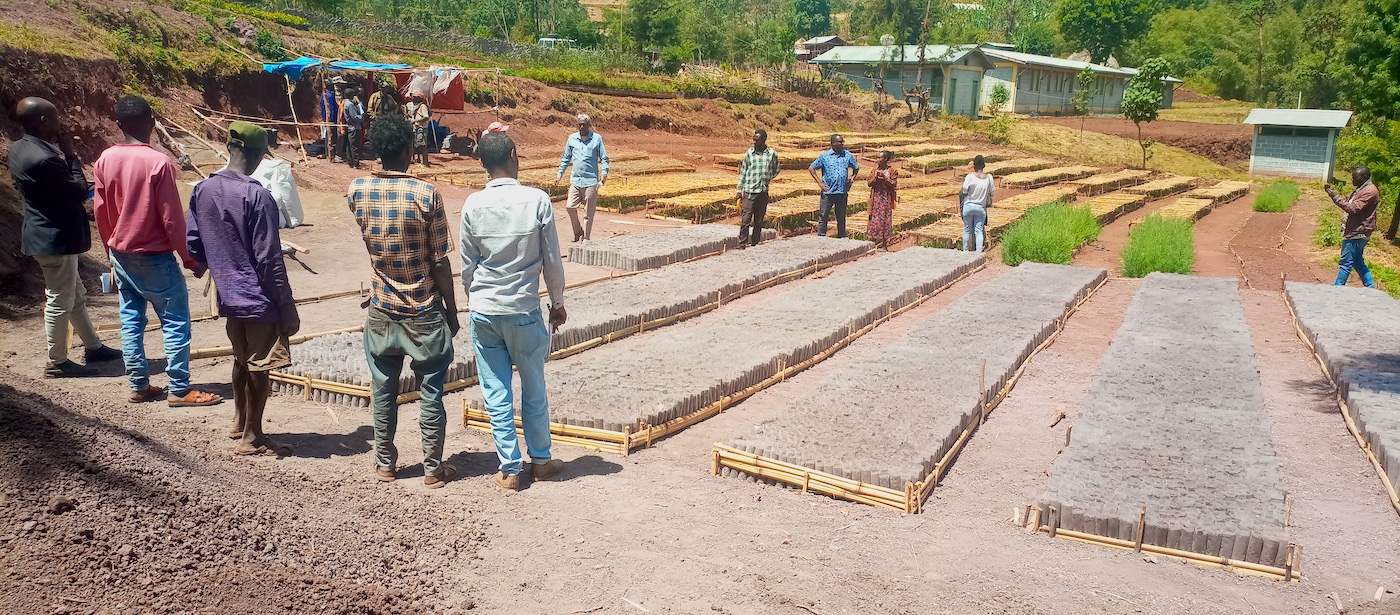Nuru Ethiopia Mitigates the Impacts of Climate Change through Reforestation in South Ethiopia Regional State
Nuru Ethiopia, with support from the Swiss Re Foundation, is equipping farmers to plant 300,000 trees. This is part of a three-year project focused on increasing climate resilience in rural communities located in South Ethiopia Regional State through nature-based solutions (NbS), like tree planting, equipping farmers to manage climate risks sustainably. Nuru Ethiopia helps farmers improve their livelihoods, increase their incomes, and improve their crop yields through the support of thriving cooperative unions. As Nuru Ethiopia supports coopeartive unions, it ensure that they’re contributing to environmental sustainability for both communities now and future generations.
Backstory: Climate Change in Ethiopia
Rural communities across sub-Saharan Africa continue to face the greatest threats associated with climate change. The Intergovernmental Panel on Climate Change (IPCC) in the Sixth Assessment Report (AR6) emphasizes that “some extreme events have already emerged which exceeded projected global warming conditions for 2100”. Ethiopia is one of the countries in East Africa most vulnerable to the impacts of the extreme events generated by climate change. Like other countries facing the worst of climate change, Ethiopia has navigated erratic rainfall patterns that have led to droughts and severe flooding. In 2022, Ethiopia experienced the driest period it had seen in 70 years, impacting food security and rural livelihoods across the country.
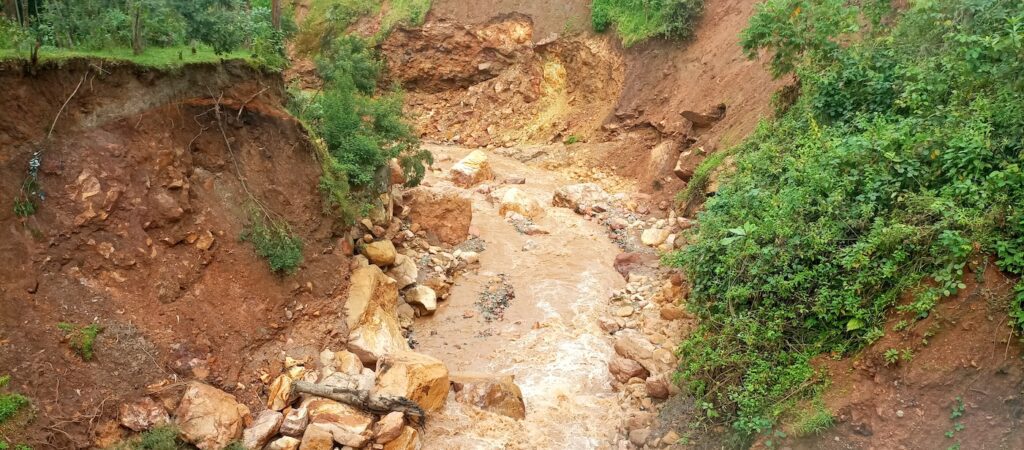
Flooding in Ethiopia creates soil erosion, uproots trees, and destroys roadways.
As Africa’s second most populous country, Ethiopia boasts one of the fastest growing economies on the continent, but “also remains one of the poorest, with a per capita gross national income of $1,020” (World Bank). As of 2024, Ethiopia had an estimated population of 129 million people, with 70% of the labor force employed by the agriculture sector. As extreme weather conditions continue, the majority of livelihoods throughout the country stand to be impacted. Both extreme events and more subtle shifts in weather and environmental patterns linked to climate change decrease productivity, crop yields, and income. The World Bank notes that “about 91 percent of the population either [experience] persistent droughts, floods, locust infestations, conflict, or some combination of them” (World Bank).
How Nuru Builds Climate Resilience in Rural Communities
To address challenges related to both the immediate and long-term impacts of climate change, Nuru supports farmers and their cooperative agribusinesses through climate-smart and nutrition-sensitive agricultural services. Nuru’s approach to building climate resilience focuses on five key elements:
- Regenerative Agriculture: These practices restore critical soil health, which is important for growing high-quality, nutrient-dense crops.
- Increased Incomes and Financial Inclusion: As Nuru-supported farmers transition to higher value crops and diversify their livelihoods, they can increase their incomes, making them more resilient to future climate shocks
- Food and Nutrition Security: Equipping farmers to grow more diverse crops and supporting their access to higher protein foods is critical to food and nutrition security for their entire families.
- Agribusiness Professionalism: Member-owned businesses that are profitable and professional are also sustainable–built to support farmers through unexpected challenges.
- Community-Based Dialogues: Nuru brings together farmers, agribusinesses, other private sector actors, government line ministries, and community leaders depending on the topic. By facilitating these meetings and including women, Nuru supports social cohesion and decision-making opportunities within households and communities.
What does this look like in Ethiopia?
Nuru Ethiopia supports thriving rural livelihoods in climate-vulnerable communities, while ensuring agribusinesses have the resources to sustainably grow and continue building their professionalism. Thriving rural livelihoods mean that farmers are well-equipped to increase both their incomes and their crop yields, which supports lasting resilience for them and their families.
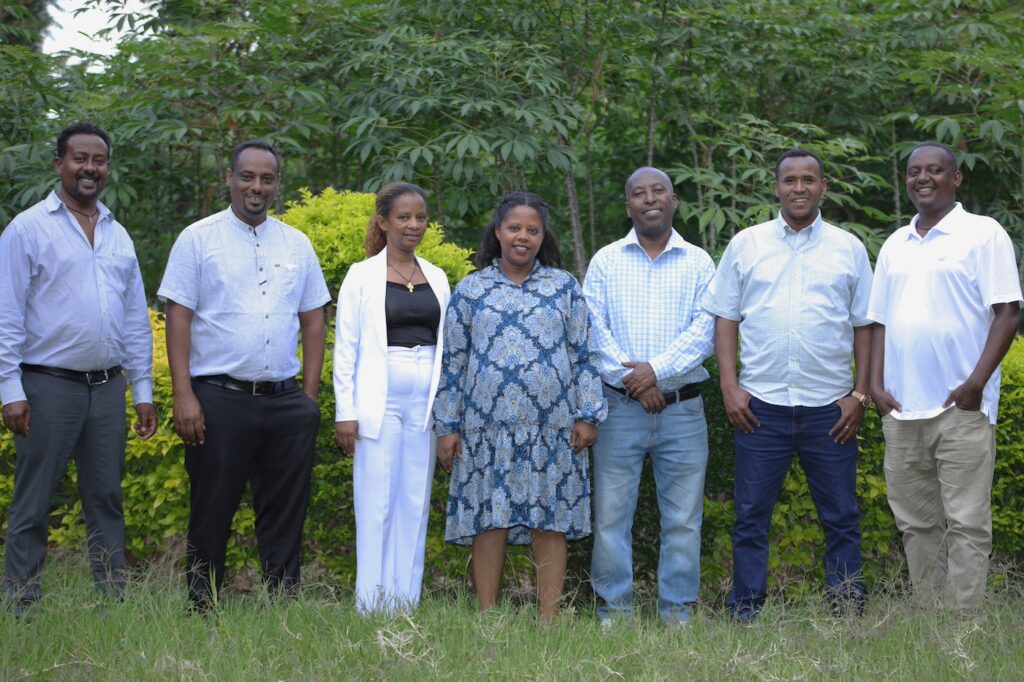
Nuru Ethiopia team, 2024
As farmers work together through professional agribusinesses, they have consistent markets for selling their produce and access to loans and other financial services. Through Nuru’s Business Development Services (BDS), cooperative unions professionalize operations, increase financial stability, and enhance farmers’ access to markets which ensures that community-driven climate adaptation is also an economic opportunity. Nuru Ethiopia further supports agribusiness unions by facilitating networking opportunities with development partners and value chain actors, ensuring the unions can increase their efficiency and garner more resources and talent. Learn more about how Nuru Ethiopia delivers BDS in this AMEA Case Study.
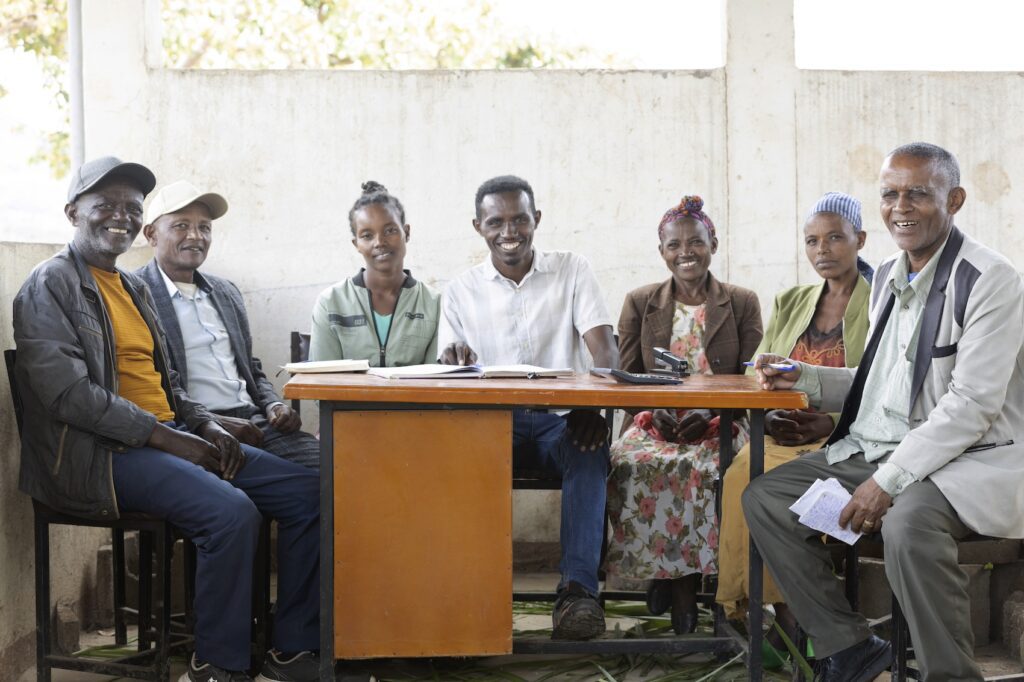
Farmer cooperative leaders, Ethiopia, 2024
As the impacts of climate change are felt more acutely in Ethiopia, the importance of climate-smart agriculture practices and nature-based solutions (NbS) is increasingly vital to ensure that rural livelihoods continue. Climate-smart agriculture (CSA) practices are “a set of agricultural practices and technologies which simultaneously boost productivity, enhance resilience and reduce GHG emissions” (World Bank). NbS are “actions to protect, conserve, restore, and sustainably use and manage ecosystems in a way that addresses social, economic and environmental challenges while simultaneously benefiting human well-being and biodiversity” (World Resources Institute).
Why does climate resilience matter?
Rural livelihoods and a healthy planet are integrally connected. By supporting agribusinesses to be hubs for climate resilience, this initiative ensures that farmers have access to financial tools, advisory services, and insurance solutions necessary to navigate climate-driven shocks while improving incomes. As farmers gain more financial resilience, they reduce their vulnerability to erratic climate conditions that disrupt agricultural income.
By increasing climate-resilient crop yields and diversifying food systems, farmers benefit from more stable, nutritious food sources, reducing the risk of food insecurity even during extreme climate events. The integration of reforestation and sustainable land management in this initiative supports both livelihoods and biodiversity conservation, ensuring that communities have long-term access to fertile land, water resources, and ecological services.
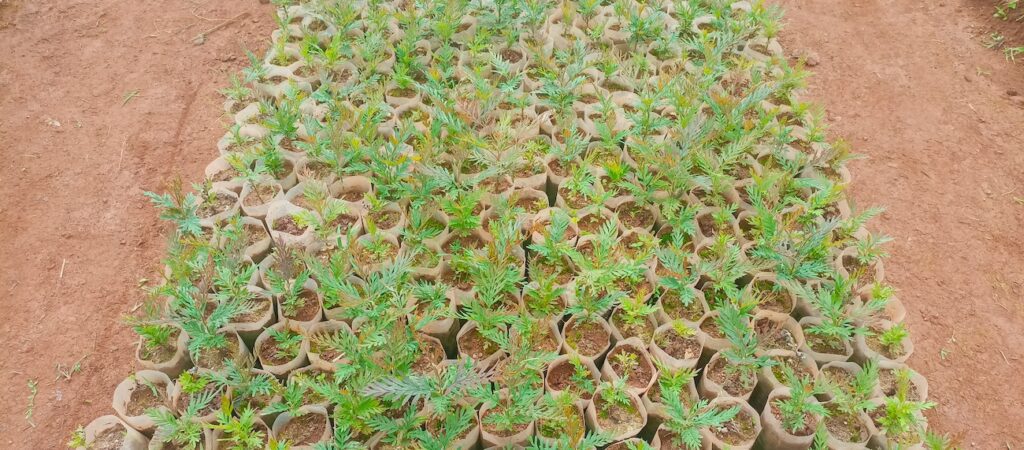
Tree seedlings in the nursery, Ethiopia, 2025
Preparing for Planting
Tree planting, also known as reforestation, is one type of NbS. A vital part of climate resilience and thriving ecosystems, trees support nitrogen fixation, decrease soil erosion (supporting healthy soil for farmers and their communities), and they manage the flow of water through the soil. As trees naturally absorb toxins in the air, including dust and smoke, they effectively serve to clean the air as well.
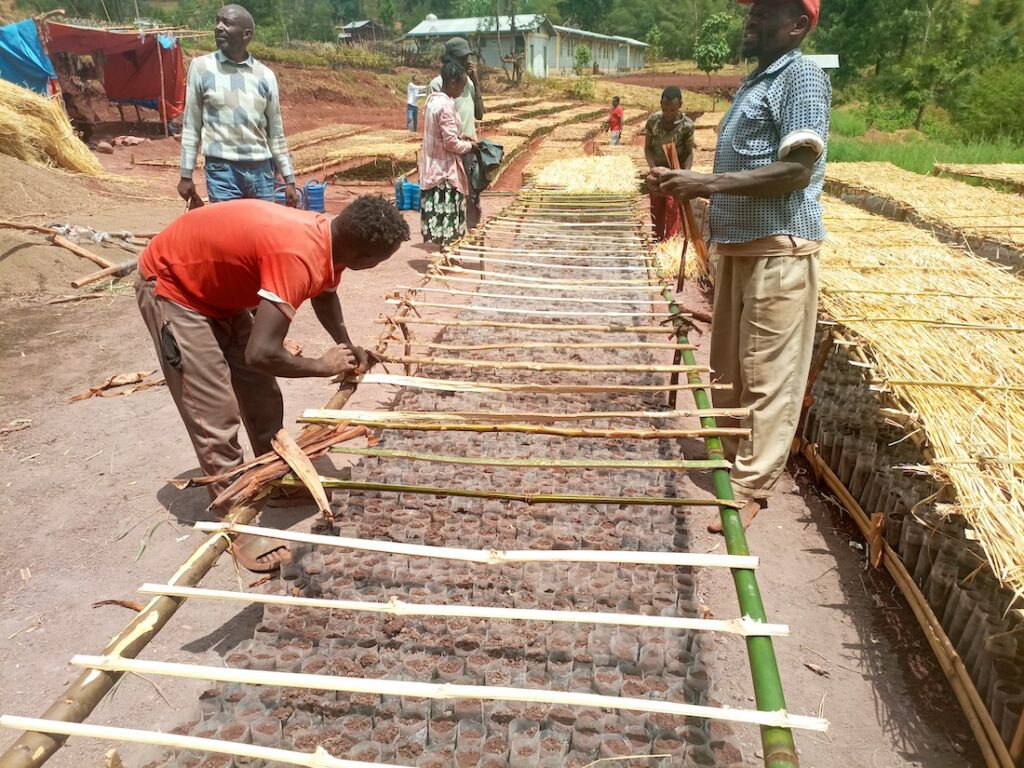
Constructing shade for seedlings at Bula tree nursery site, 2025
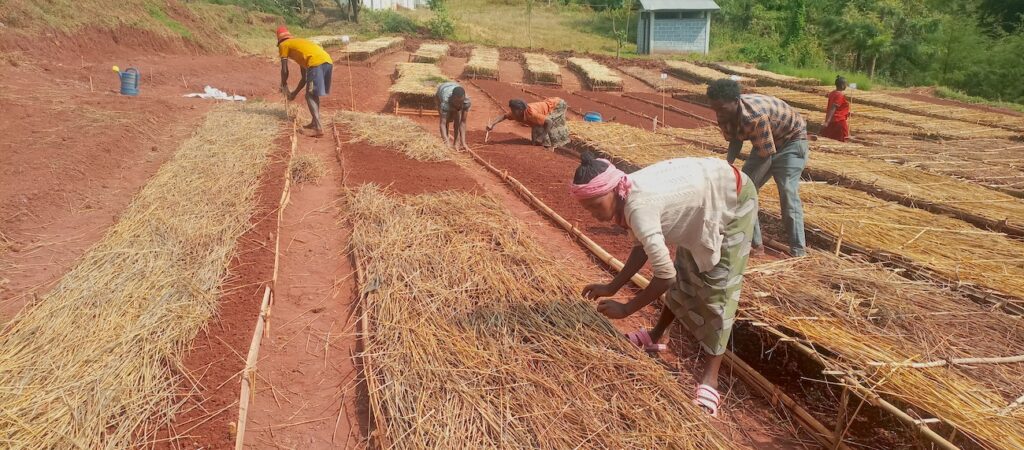
Transplanting seeds at the Bula tree nursery, 2025
In the Gamo Zone of South Ethiopia Regional State, seedling production is underway for the first round of trees that will be planted by Nuru Ethiopia-supported agribusinesses in 2025. Seedlings must reach a level of maturity that ensures the small trunk of the tree is sturdy enough to withstand initial winds and rains. Once the trees reach this level of maturity, local agribusiness staff from Hidota Union and Bule Farmers’ Primary Cooperative will partner with local government representatives to remove the seedlings from their current nursery site, distribute them for planting, and begin planting them on community-managed land. Nuru Ethiopia will support this effort by hosting tree-planting events for community members and ensuring that tree planters have the training necessary for proper planting and care of the young trees. This future reforestation site, which borders farming land, will reinforce the farmers’ climate-smart activities, while supporting local ecosystem restoration.
“The tree-planting project brings a new renaissance for our degraded watershed and cooperatives. We are now rejoined and collaborating to realize tree-planting activities and professionalize our cooperative.” –Mr. Israel, Chairman of a Bule Farmers’ Primary Coooperative
Next Steps
In preparation for this initiative and to ensure the community is supportive of the work, Nuru Ethiopia consulted with local leaders and experts on community environmental protection needs. Watersheds and existing land use were studied to identify the needs and challenges. In community discussions, Nuru Ethiopia outlined which initiatives would be given priority, and two community-led committees were established to support the upcoming work, ensuring community ownership.
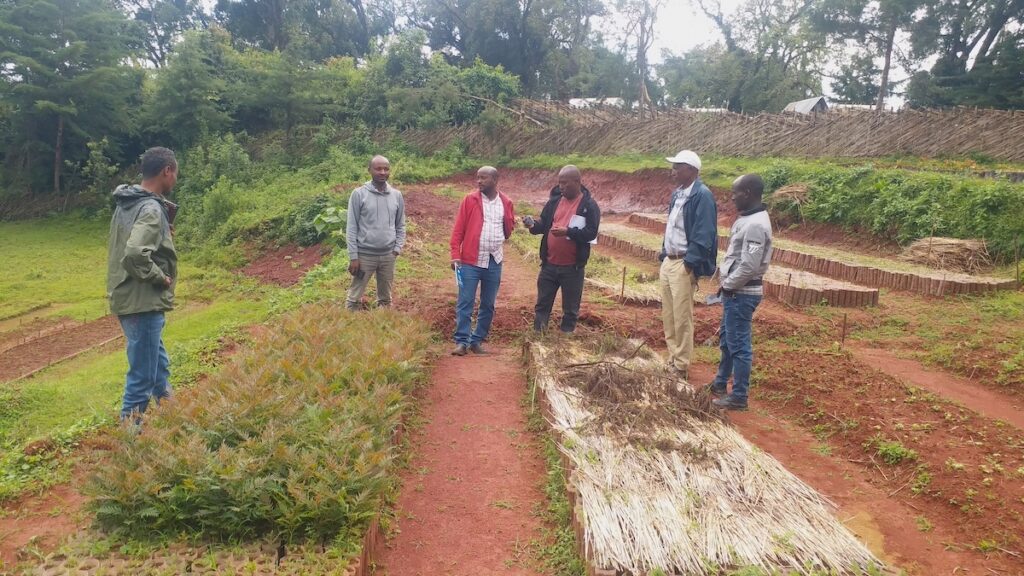
Observation of the existing nursery site in Bula kebele with Nuru Ethiopia team and local partners, 2025
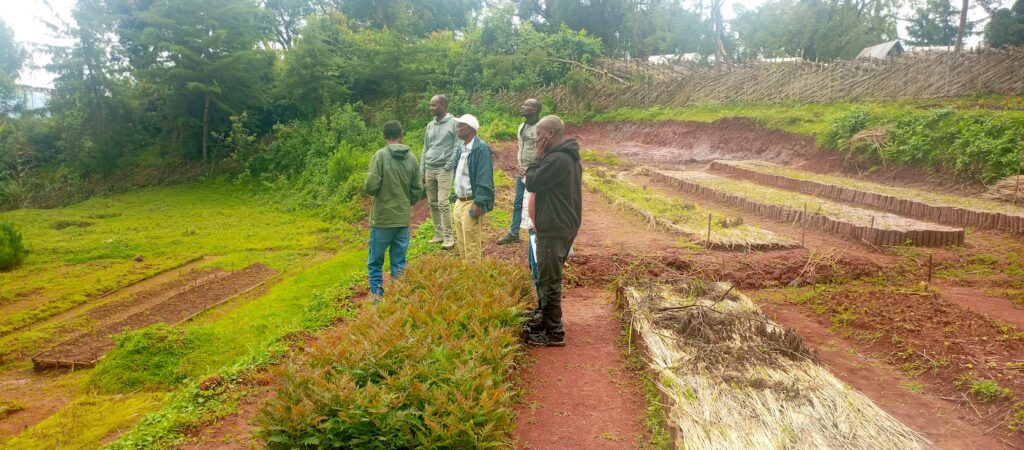
Over the next 3 years, as part of this initiative, Nuru Ethiopia will support the planting of 300,000 trees across 160 sq km of land. This reforestation project is taking place in just one of the 58 designated National Forest Priority Areas (NFPAs) across the country. The Government of Ethiopia (GoE) named these sites as important natural resource landscapes, and they have been prioritized for protection, conservation, and commercial use. During this initiative, Nuru Ethiopia will document challenges to implementation, lessons learned, and achieved successes. These learnings will support a refined implementation strategy that can be applied to future expansion into other climate-vulnerable areas both within and beyond Ethiopia’s borders.


